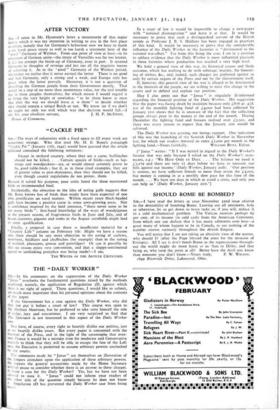"CACKLE PIE"
SIR,ŌĆöThe ways of columnists with a fixed space to fill every week are semetimes strange. Who that read Mr. H. E. Bates's paragraph "Cackle Pie" (January 17th, 1941) would have guessed that the article criticised contained the fololwing sentences: Except in orchard country, where they are a curse, bullfinches should not be killed, . . Certain species of birdsŌĆösuch as lap- wings and woodpeckersŌĆöare, or would almost certainly prove to be, good table-birds ; but if, as in these cited examples, they are of greater value as pest-destroyers, then they should not be killed, even though county regulations do not protec. them.
Because it suited his purpose, your critic listed the three mentioned birds as recommended food.
Incidentally, the objection to the idea of eating gulls suggests that Mr. Bates knows less of birds than might have been expected of one who pontificates on rural matters. Within recent years black-headed gulls have become a positive curse in some corn-growing areas. Nor is confidence inspired by the bald sentence, "there never seem to be too many birds ": first-hand knowledge of the ways of woodpigeons at the present season, of frugivorous birds in June and July, and of hcuse-sparrows, pigeons and rooks in the August cornfields might lead In some qualification.
Finally, a proposal in case there is insufficient material for a "Country Life" column on February 7th: Might we have a reason why there should be any more objection to the eating of curlews, moorhens, fieldfares and chaffinches (for example) than to the eating ŌĆó of mallard, pheasants, grouse and partridges? Or can it possibly be that no reason exists save convention, and that a sloppy-sentimental appeal to unthinking prejudice was being made?ŌĆöI am,
THE WRITER OF THE ARTICLE CRITICISED.






























 Previous page
Previous page